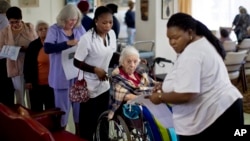JOHANNESBURG —
After months of debate and controversy, South Africa’s political scene has suddenly fallen quiet as parties are giving voters time to deliberate their choices in Wednesday’s poll. The vote is the nation’s fifth since South Africa became a democracy in 1994.
In 1994, nearly 20 million South Africans lined up for hours to vote in the nation’s first democratic election.
For most South Africans, it was their first chance to participate fully in their society, following the end of the apartheid system that denied black South Africans the right to full citizenship.
But since that day, the nation has never seen that much enthusiasm at the polls, and voters this year say they are less likely than ever to vote.
Some eligible voters say they are disgusted by the wave of corruption allegations that has washed over African National Congress leader, President Jacob Zuma.
Others say they are disappointed that the ruling ANC has failed to extend basic services like clean water and electricity to all South Africans, and that the gap remains too wide between the haves and the have-nots.
Perhaps with this in mind, Zuma’s call to South Africans days before the election was not for them to support him. It was for them to vote, period.
He even encouraged journalists, who he had accused just minutes earlier of not treating him fairly in their coverage of a recent scandal over his alleged use of $23 million dollars of government money to upgrade his personal home.
“I would like to use this opportunity, really, to say, on Wednesday, 7th of May, is voting time. And I hope you guys are going to vote. You guys. Because I always see you near voting polls, not voting. Everybody should come out and vote. Employers, please allow workers to go out and vote. ... It is just one day, and they must be allowed to go and vote, and make their choice as determined by our constitution. So I am appealing to everyone to cooperate with everyone on that day,” said Zuma.
Some areas have declared themselves “no-go areas” for voting officials, such as the Johannesburg area township of Gugulethu, where people held protests this week over the lack of basic services.
Elsewhere, in a town in North West province, the president himself was unable to attend a rally before the vote because of volatility.
Results are expected May 10. and local pollsters have predicted the ANC will win with 63 percent of the vote.
Zuma said he was confident of victory. “We think the ANC will win the elections. Overwhelmingly, not just by, you know, skin of the teeth,” he said.
It is a softer version of something Zuma’s colleagues have often said during the campaign, which predicted an ANC win, “whether you like it, or not.”
Those words, perhaps, will strike a chord with many South Africans who say that in the 20 years between apartheid and democracy, too little has changed and they have exchanged one corrupt regime for another.
In 1994, nearly 20 million South Africans lined up for hours to vote in the nation’s first democratic election.
For most South Africans, it was their first chance to participate fully in their society, following the end of the apartheid system that denied black South Africans the right to full citizenship.
But since that day, the nation has never seen that much enthusiasm at the polls, and voters this year say they are less likely than ever to vote.
Some eligible voters say they are disgusted by the wave of corruption allegations that has washed over African National Congress leader, President Jacob Zuma.
Others say they are disappointed that the ruling ANC has failed to extend basic services like clean water and electricity to all South Africans, and that the gap remains too wide between the haves and the have-nots.
Perhaps with this in mind, Zuma’s call to South Africans days before the election was not for them to support him. It was for them to vote, period.
He even encouraged journalists, who he had accused just minutes earlier of not treating him fairly in their coverage of a recent scandal over his alleged use of $23 million dollars of government money to upgrade his personal home.
“I would like to use this opportunity, really, to say, on Wednesday, 7th of May, is voting time. And I hope you guys are going to vote. You guys. Because I always see you near voting polls, not voting. Everybody should come out and vote. Employers, please allow workers to go out and vote. ... It is just one day, and they must be allowed to go and vote, and make their choice as determined by our constitution. So I am appealing to everyone to cooperate with everyone on that day,” said Zuma.
Some areas have declared themselves “no-go areas” for voting officials, such as the Johannesburg area township of Gugulethu, where people held protests this week over the lack of basic services.
Elsewhere, in a town in North West province, the president himself was unable to attend a rally before the vote because of volatility.
Results are expected May 10. and local pollsters have predicted the ANC will win with 63 percent of the vote.
Zuma said he was confident of victory. “We think the ANC will win the elections. Overwhelmingly, not just by, you know, skin of the teeth,” he said.
It is a softer version of something Zuma’s colleagues have often said during the campaign, which predicted an ANC win, “whether you like it, or not.”
Those words, perhaps, will strike a chord with many South Africans who say that in the 20 years between apartheid and democracy, too little has changed and they have exchanged one corrupt regime for another.




